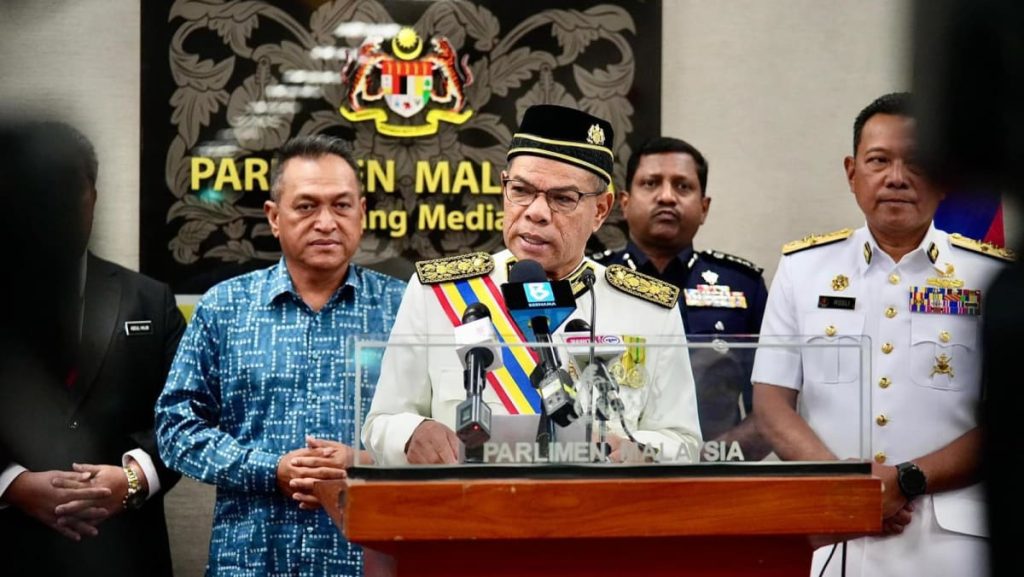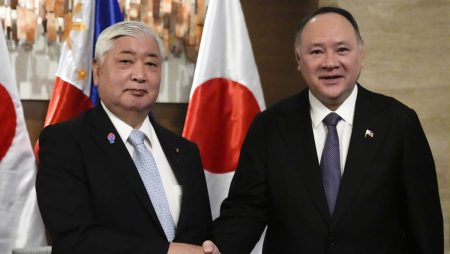This incident revolves around a maritime shooting involving the Malaysian Maritime Enforcement Agency (MMEA) and a boat carrying Indonesian nationals, sparking a diplomatic ripple between Malaysia and Indonesia. The incident, which occurred off the coast of Banting Beach in Kuala Langat, Malaysia, on January 24th, resulted in the death of one Indonesian national and injuries to four others. Malaysian authorities are investigating the incident under multiple charges, including attempted murder, unlawful discharge of firearms, obstruction of public servants, and migrant smuggling.
The Malaysian Minister of Home Affairs, Saifuddin Nasution Ismail, provided details of the incident, stating that the MMEA vessel, Penggalang 31, initially attempted to hail the Indonesian boat using a loudhailer. However, the boat allegedly ignored the warnings and attempted to ram the MMEA vessel, specifically targeting its engine, raising concerns of a potential explosion. MMEA officers then responded by firing warning shots into the air before aiming at the boat’s engine in an attempt to disable it. Despite these measures, the boat continued its evasion and escaped capture, prompting the MMEA vessel to return to its base.
Following the incident, two Indonesian men were found on the boat; one was deceased, and the other sustained critical injuries and was transported to a hospital in Klang. The remaining three Indonesians later appeared at a hospital in Serdang with gunshot wounds, prompting a police report from a medical officer. An Indonesian man suspected of being a “transporter,” facilitating the undocumented entry and exit of individuals into Malaysia, has also been arrested in connection with the incident. Preliminary investigations suggest a link between this individual and the boat involved in the pursuit.
The incident has drawn concern from Indonesia, who urged a transparent investigation into the shooting, including the possibility of excessive force used by the Malaysian authorities. The Indonesian Ministry of Foreign Affairs released a statement indicating that the five Indonesian nationals on the boat were attempting to leave Malaysia illegally. The issue was further elevated during Indonesian President Prabowo Subianto’s state visit to Malaysia, where he expressed confidence in Malaysia’s commitment to a thorough investigation.
Malaysian Prime Minister Anwar Ibrahim responded to these concerns, promising a transparent investigation and assuring the Indonesian government that a preliminary report would be submitted through the Indonesian embassy in Malaysia. He also appealed for calm amongst Malaysians following a protest at the Malaysian embassy in Jakarta, where approximately 100 individuals from human rights groups and labour unions pelted the embassy with eggs.
This incident underscores the complexities of maritime security and illegal migration in the region. The Malaysian authorities are facing scrutiny over their use of force, while the Indonesian government is seeking justice for its citizens. The investigation continues under several serious charges, including attempted murder and human trafficking. The outcome of this investigation will likely have implications for the relationship between Malaysia and Indonesia, as well as for regional efforts to combat illegal migration. The case highlights the need for enhanced cooperation and communication between the two countries to prevent similar incidents in the future.
The incident also brings to light the often perilous journeys undertaken by undocumented migrants, highlighting the desperation that drives individuals to risk their lives in search of better opportunities or to escape difficult circumstances. The role of “transporters” and facilitators of illegal migration is also underscored, revealing the complex networks involved in human smuggling. The charges brought against the suspected transporter in this case will likely lead to further investigations into these networks and their operations. The investigation must address not only the immediate circumstances of the shooting but also the broader context of migrant smuggling and the vulnerabilities of those who are exploited by these criminal networks.
The incident has sparked public outrage and protests in both countries, reflecting the sensitive nature of the issues involved. In Indonesia, the protest at the Malaysian embassy highlights the anger and frustration felt over the death and injuries of Indonesian citizens. In Malaysia, the Prime Minister’s call for calm suggests a recognition of the potential for this incident to escalate tensions. The transparent and thorough investigation promised by the Malaysian government is crucial for addressing these public concerns and maintaining trust between the two countries.
The multiple charges filed in this case reflect the seriousness of the allegations and the potential consequences for those involved. The attempted murder charge, under Section 307 of the Penal Code, signifies the severity of the injuries sustained by the Indonesian nationals. The charge under the Arms Act 1960 relates to the discharge of firearms by the MMEA officers, posing questions about the protocols and justification for their actions. The obstruction of public servants charge pertains to the alleged actions of the Indonesian boat in attempting to evade capture. Finally, the charge under the Anti-Trafficking in Persons and Anti-Smuggling of Migrants Act highlights the broader issue of human smuggling and the exploitation of vulnerable individuals. Each of these charges must be meticulously investigated to ensure accountability and justice.
The investigation into this incident must be conducted with utmost transparency and impartiality to determine the full sequence of events and the culpability of all parties involved. It must also consider the broader context of illegal migration and human smuggling in the region. The findings of the investigation will be crucial for informing future policies and practices related to maritime security, migrant rights, and international cooperation between Malaysia and Indonesia. The incident serves as a stark reminder of the challenges posed by illegal migration and the need for comprehensive solutions that address the root causes of this phenomenon while upholding the human rights of all individuals.










